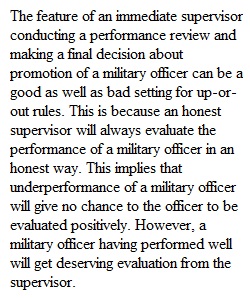


Q Military In all 4 branches of the U.S. military, officers who are denied promotion too many times (typically twice, for most officers) are forced to leave the service. In the typical case, an officer who is found to be lacking in a certain area and fails to get promoted is given one year to rectify the deficiency and then reapply for promotion, where the second time around it is “up or out”. In 2015, U.S. Secretary of Defense Ash Carter called for a major overhaul of personnel policies in the military, including the up-or-out policy. Specifically, the proposal called for the up-or-out policy to be eliminated, or at least relaxed (so that officers wouldn’t be forced to leave after only being denied promotions twice). The proposal met with fierce resistance from some high-ranking military officials, including the Joint Chiefs of Staff. Another proposed reform was to reduce the minimum amount of time that an officer must spend at a given level before promotion to the next level. For military officers, one’s immediate supervisor has a lot of power, by conducting the performance review that determines whether a promotion is granted. This gives officers an incentive to try to curry favor with their supervisors, perhaps becoming “yes men” in an effort to avoid a bad performance evaluation. 1. What features of the military make it a particularly good (or bad) setting for up-or-out rules? 2. What are the predicted effects that both proposals (i.e., eliminating or weakening up-orout, and shortening the amount of time that officers must spend in one rank before being eligible for promotion) would have on the composition of the military, i.e., on who wants to enlist? 3. The top military personnel (e.g., the Joint Chiefs of Staff) were resistant to both policies. But what about the lower-level military officers who would be directly affected by the policies? How do you think those officers would react to both policies, and why? 4. Suppose that up-or-out remains in place (i.e., Carter’s proposals are not implemented). What are your recommendations for minimizing the sycophantic behavior that occurs when officers curry favor with their direct supervisors in hopes of getting good performance evaluations? 5. Suppose that both proposals are enacted, and the military brings you in as an outside compensation consultant to try to help them with the transition. How would you implement both policies, and what steps would you take to ensure as smooth a transition as possible? What do you foresee as the biggest challenges during the transition? Note: This case is based on an article in Military Times, entitled “The Pentagon’s Up-or-Out Promotion Reforms Stall Amid Internal Divide”, published on March 8, 2016, by Andrew Tilghman.
View Related Questions